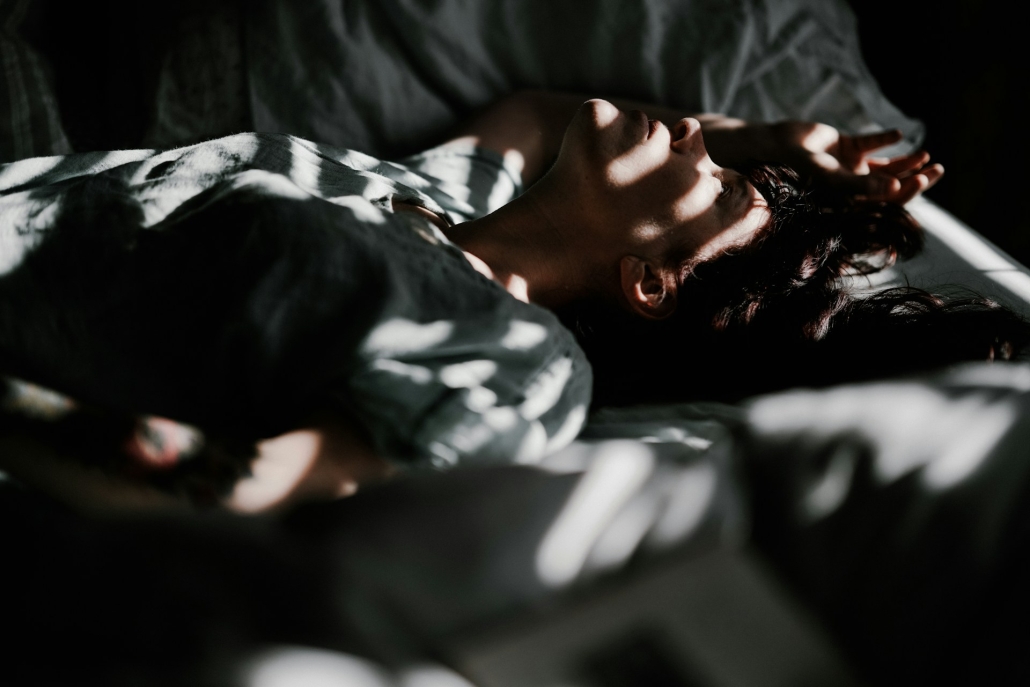Sleep disorders are a common struggle, affecting millions of people worldwide. Among these, restlessness and Restless Legs Syndrome (RLS) are particularly troublesome, disrupting sleep and diminishing overall well-being [1]. While doctors sometimes prescribe traditional treatments like sleep medications and dopamine agonists, some patients turn to alternative methods, including medical cannabis, for potential symptomatic relief [2]. Here, we’ll explore the potential efficacy of cannabis for restlessness, parsing out what may or may not help people feel more comfortable in their bodies.
Understanding restlessness and Restless Legs Syndrome
Restlessness, especially at night, can significantly impact sleep quality. For example, patients with restless symptoms often struggle to fall asleep or stay asleep. As a result, many experience fatigue, irritability, and other health issues [1]. Restless Legs Syndrome, a neurological disorder characterized by an uncontrollable urge to move the legs, particularly at night, is another condition that can severely affect sleep. RLS symptoms, such as tingling, burning, or aching in the legs, can make it difficult for patients to relax, further compounding sleep problems [3].
Cannabis and Autoimmune Disorders: What You Need to Know
The Potential of Cannabis for Sleep Disorders
In recent years, the potential use of cannabis for dealing with sleep disorders, including restlessness and RLS, has gained attention. Typically, cannabis products contain a variety of compounds, such as THC (tetrahydrocannabinol) and CBD (cannabidiol), which interact with the brain’s cannabinoid receptors. In turn, these interactions may produce feelings of relaxation for some users. While cannabis is commonly associated with recreational use, researchers continue to explore its medicinal use for various medical conditions, including sleep disorders and chronic pain [4].
Research into the efficacy of cannabis for restlessness, RLS, and pain relief is still in its early stages, so scientists have yet to draw definitive conclusions. However, some studies suggest that cannabis may help improve sleep quality and reduce persistent symptoms associated with these conditions [5]. For example, a recent survey conducted as a retrospective chart review found evidence that some of the patients with restless leg syndrome experienced mild improvement in their symptoms after using cannabis. These findings align with anecdotal evidence from cannabis users who report that smoking cannabis or using CBD oil before bed helps them fall asleep more easily and experience fewer interruptions during the night [5]. Even so, other researchers argue that cannabis may serve more as a placebo in certain instances [6].
Cannabis and the Endocannabinoid System
Cannabis use in patients with restlessness and RLS
When considering cannabis for restlessness or RLS, it’s essential to consider dosage carefully. Also, it’s crucial to weigh the evidence and consult a healthcare professional for tailored treatment. Some experts recommend starting with lower doses of THC, partially perhaps because higher doses might induce a stimulating effect, which might do the opposite of encouraging sleep [7]. On the other hand, some patients may benefit from the use of CBD oil, which is non-psychoactive and may encourage relaxation in some people without the risk of intoxication [8].
It’s important to note that the response to cannabis can vary widely among individuals. For example, in trials, some patients found that cannabis use led to an overall relief of their symptoms, while others experienced only mild improvement or no significant change. Likewise, factors such as dosage, method of consumption, and the presence of other medical conditions can all influence the efficacy of cannabis. For instance, smoking cannabis might provide quick relief – however, smoking also carries the risk of adverse effects, particularly with long-term use [9].
CBN Gummies Review: What Does CBN Do?
CBD and CBN for sleep
Theories regarding the potential benefits of cannabidiol (CBD) and cannabinol (CBN) for sleep, particularly concerning conditions like insomnia and RLS, have gained attention in the field of alternative medicine. Indeed, both cannabinoids interact with the brain’s endocannabinoid system. Notably, this system modulates experiences related to pain, sleep, mood, and hunger. As such, many study-based theories suggest that these cannabinoids may contribute to symptom relief for individuals suffering from anxiety, depression, and sleep disorders. However, researchers have not pinpointed whether or not this action results in significant relief [10, 11]. Unlike THC, which is psychoactive, CBD and CBN are non-intoxicating, making them an appealing option for those who seek better sleep without getting high.

CBD, in particular, has been studied for its potential to reduce anxiety, a common contributor to insomnia and RLS. Though research is inconclusive, initial studies show that CBD may help by modulating the brain’s response to stress [11]. Meanwhile, CBN is thought to have a mildly sedative effect, which could complement the use of dopamine agonists [10]. However, the efficacy of these cannabinoids can vary depending on the dose and individual response, and more research is needed to fully understand their role in affecting sleep disorders [6]. Thus, individuals should consult a healthcare professional for guidance.
Full-Spectrum CBD Gummies for Sleep Enhancement
A premium source of organic cannabis products
For cannabis enthusiasts seeking the best CBD, CBN, and many other products, Earthy Now has something for everyone.
Explore these popular products from Earthy Now:
- Terpenes
- CBD Flower
- Hemp Smokes
- Gummies (including Sleep Gummies!)
- Lozenges
- Tablets (THC Free!)
- Soothing Relief Lotion
- Soothing Relief Salve
- CBD Pet Tinctures (no THC!)
- Oils
- Pre-Rolls
The role of medical marijuana in sleep disorders
Medical marijuana, prescribed under the guidance of a healthcare professional in states where it is legal, is sometimes an option for patients with chronic sleep problems who have not found relief with conventional treatments. Indeed, sleep physicians may consider medical marijuana for patients with persistent restlessness or RLS, particularly when other treatments like dopamine agonists or sleep medications fail [12].
However, clinical trials on the use of medical marijuana for sleep disorders have shown mixed results. While some studies indicate that cannabis use may improve sleep scores and provide symptomatic relief, others highlight the potential for increased risk of side effects. For example, some people might develop tolerance and dependence [12]. For this reason, patients must consult with their healthcare providers to determine if medical marijuana is an appropriate option.
Cannabis and Epilepsy: Debunking Myths and Examining Evidence
Alternative methods and considerations
While cannabis may offer relief for some patients, it also has risks. Indeed, the use of any psychoactive plant, including cannabis with Delta-9 THC, carries the potential for abuse and adverse effects, particularly when used without medical supervision. For some, higher doses of THC may lead to increased anxiety, paranoia or even exacerbate sleep problems. Furthermore, there is evidence to suggest that chronic use of cannabis, especially in large amounts, can lead to the development of tolerance, requiring higher doses to achieve the same effects. As a result, these individuals may have a higher risk of dependency [13].
For those hesitant about using cannabis or seeking complementary approaches, other treatments are available. For example, dopamine agonists, which doctors commonly prescribe for RLS, may help manage symptoms by targeting the brain’s dopamine receptors. However, these come with their own set of potential side effects [14]. Additionally, non-pharmacological methods such as regular exercise, sleep hygiene, and relaxation techniques may improve sleep quality [15].
Key takeaway: exploring cannabis for restlessness
When conventional treatments fail to provide sufficient relief, cannabis may offer a promising supplement for people struggling with restlessness and RLS [2]. However, as with any treatment, it’s essential to approach cannabis use with caution and understand that individuals respond differently.
While research continues to explore the full potential and limitations of cannabis for sleep disorders, research suggests that, for some patients, cannabis may potentially provide relief from certain symptoms and overall quality of life. In contrast, other research suggests the evidence is insufficient [6]. Thus, further clinical trials and studies are needed to establish definitive guidelines for its use and efficacy, ensuring patients receive the most helpful and safe treatment options.
Go to Earthy Now to explore an exciting array of low-THC, high-CBD cannabis products for relaxation and well-being!
Medical Disclaimer / Legal Disclaimer – Information is provided for educational purposes. It does not and is not intended to constitute legal advice or medical advice. We attempt to be accurate and up-to-date, but the legality of cannabinoids and the science of cannabis are evolving. The author is neither a legal professional nor a medical expert. Before buying or using any products, you should check with your local authorities and medical providers.
References
- Sleep Statistics and Facts
- Cannabis for Restless Legs Syndrome
- Mayo Clinic: Restless Legs Syndrome
- Does Marijuana Actually Help with Sleep Problems?
- Physicians Should Question Patients with Restless Leg Syndrome About Cannabis Use
- A Double-Blind, Randomized, Placebo-Controlled Study of Cannabinoids and Sleep
- Low-dose THC Can Relieve Stress; More Does Just the Opposite
- CBD For Sleep: How It Works, Benefits And Risks
- Modes of Cannabis Use: A Secondary Analysis of an Intensive Longitudinal Natural History Study
- Cannabinol (CBN; 30 and 300 mg) Effects on Sleep
- Is CBD a Safe and Effective Sleep Aid?
- Cannabis Use in Patients with Insomnia and Sleep Disorders
- Marijuana Side Effects: Physical, Mental, and Long-Term Effects
- Benefits and Risks of Dopamine Agonists
- The Connection Between Diet, Exercise, and Sleep




 Earthy Now
Earthy Now